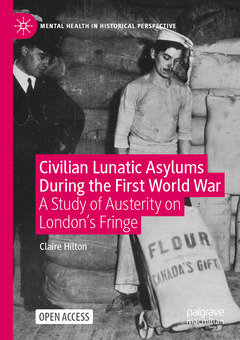Description
Civilian Lunatic Asylums During the First World War, 1st ed. 2021
A Study of Austerity on London's Fringe
Mental Health in Historical Perspective Series
Author: Hilton Claire
Language: English
Subjects for Civilian Lunatic Asylums During the First World War:
Civilian Lunatic Asylums During the First World War
Publication date: 11-2020
Support: Print on demand
Publication date: 11-2020
Support: Print on demand
Civilian Lunatic Asylums during the First World War
Publication date: 10-2020
294 p. · 14.8x21 cm · Hardback
Publication date: 10-2020
294 p. · 14.8x21 cm · Hardback
Description
/li>Contents
/li>Biography
/li>Comment
/li>
This open access book explores the history of asylums and their civilian patients during the First World War, focusing on the effects of wartime austerity and deprivation on the provision of care. While a substantial body of literature on ?shell shock? exists, this study uncovers the mental wellbeing of civilians during the war. It provides the first comprehensive account of wartime asylums in London, challenging the commonly held view that changes in psychiatric care for civilians post-war were linked mainly to soldiers? experiences and treatment. Drawing extensively on archival and published sources, this book examines the impact of medical, scientific, political, cultural and social change on civilian asylums. It compares four asylums in London, each distinct in terms of their priorities and the diversity of their patients. Revealing the histories of the 100,000 civilian patients who were institutionalised during the First World War, this book offers new insights into decision-making and prioritisation of healthcare in times of austerity, and the myriad factors which inform this.
1. Introduction: civilians, lunacy and the First World War.- 2. Infrastructure: rules, walls, obstacles and opportunities.- 3. Certified insane: concepts and practices.- 4. Personnel: staffing the asylums and serving the Colours.- 5. Food, farm and fuel: an inequitable supply chain.- 6. Patients and their daily life.- 7. Difficult diseases: tuberculosis and other infections.- 8. Accidents, injuries, escapes and suicides.- 9. Shackles and chains: some concluding thoughts.
Claire Hilton is a Research Affiliate at the Centre for the History of Emotions at Queen Mary University of London, UK. She is author of Improving Psychiatric Care for Older People: Barbara Robb’s Campaign, 1965-1975 (Palgrave, 2019), which was shortlisted for the 2018 RHS Whitfield Prize.
Provides the first book-length study of the experiences of civilian patients in asylums during the First World War Explores the effects of wartime austerity and deprivation on the provision of care across four London asylums Draws extensively on archival and published sources to reveal the impact of medical, scientific, political, cultural and social change on civilian asylums This book is open access, which means that you have free and unlimited access
© 2024 LAVOISIER S.A.S.




